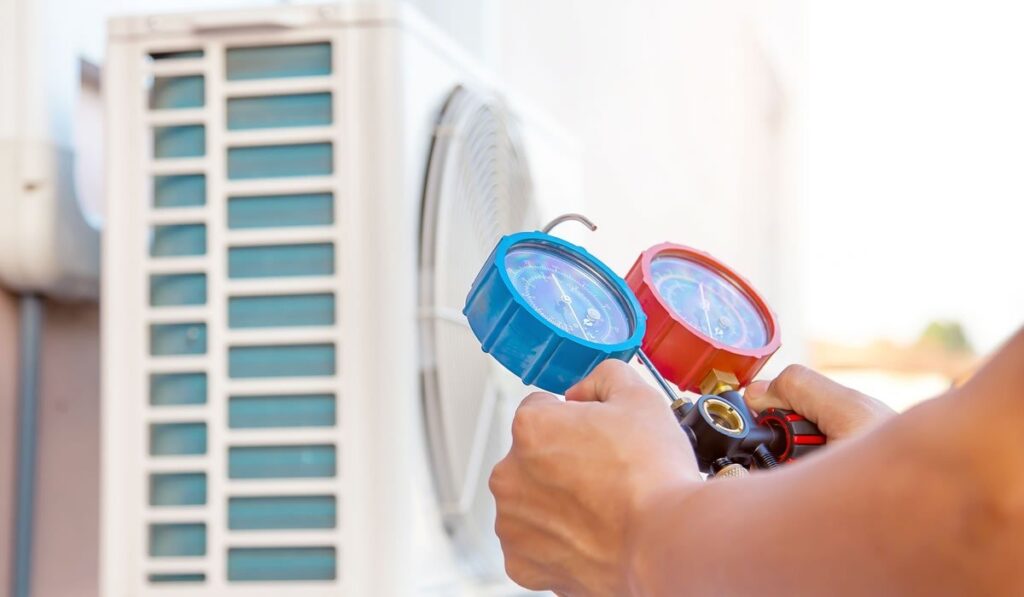ACs operate by using the refrigerant gas to absorb heat and then release it into the environment. Some air conditioners can cause trouble, and thus, homeowners or technicians suggest topping up the gas. However, the mere topping refrigerant gas is not always the best and safest way to go about it. There are several issues related to air conditioner gas top-ups that most people are unaware of. Visit the webpages of different companies to know about aircon top-up gas prices and concerns, emphasizing the need for proper diagnosis and restoration.
1. Gas Top-Up Is Not a Long-Term Solution
A gas top-up is one of the most misconceived answers to an air conditioning problem, mainly because people compare it to car fuel depletion. This misconception seems plausible: refrigerant gas over time depletes, warranting top-ups. But the truth is that the air conditioning system is a sealed unit—if the gas is low, there surely must be a leak somewhere. So, topping up the gas without locating and fixing the leak is a measure taken in vain. Eventually, the gas will escape again, and the cooling problem will come back. This continuing cycle creates recurrent leak problems that take up time and money. Visit www.lsairconservicing.sg/ to learn more about the effects of gas top-up.
2. Repeated Top-Ups Induce Compressor Damage
When the unit has a low level of refrigerant, it has to work extra hard to reach and maintain the temperature that is desired. This extra exertion overheats the air conditioner. Frequent overheating will eventually render the compressor defective, which is the costliest part of an air conditioner. Too many times, topping off the gas without solving the actual problem will result in an increased risk of burning out the compressor. Hence, the repair bill can come up to almost the entire cost of replacing the system.
3. Incorrect Gas Levels Mean Bad Performance
Refrigerant can easily be charged without consideration for actual quantities; this can lead to either undercharging or overcharging. Any excess or shortfall in refrigerant gas affects the air conditioner’s performance: uneven cooling, high electricity bills, and discomfort. Proper charging is performed by experienced technicians equipped with pressure gauges and temperature readings; untrained hands or low-cost providers may skip those, leading to lousy performance on the part of the system.
4. It May Void Your Warranty
Air conditioning systems are usually equipped with a dated manufacturer’s warranty that explains repairs or defects attributed to improper installation. However, unauthorized servicing and the unlicensed technician filling the air conditioning system will void such warranties and, in the event of system failure due to improper filling, manufacturer coverage might be denied. Always check whether your technician is certified and whether their methods comply with manufacturer standards.
5. Masking the Bigger Issues
A gas fill could restore cooling for a short while, but it may also be hiding significant underlying problems. If a technician does not carry out a complete inspection leaking coils, broken valves or corroded pipes might go undetected. Over a period, these problems will grow into larger failures and increased repair costs. Always consider a proper diagnostic check before performing any service involving refrigerants.
Conclusion: Proper Diagnosis and Repair
Gas filling might sound like a quick fix to an air conditioner not performing well, but more often than not, it will create more problems than it solves. Without identifying and addressing the root cause, the remedy remains temporary. It can potentially worsen the situation. Always make sure to consult a qualified technician for proper diagnosis and professional repair. That will ensure reliable performance and an extended lifespan for your AC. By taking care, your air conditioner will pay you back with years of commendable cooling.

